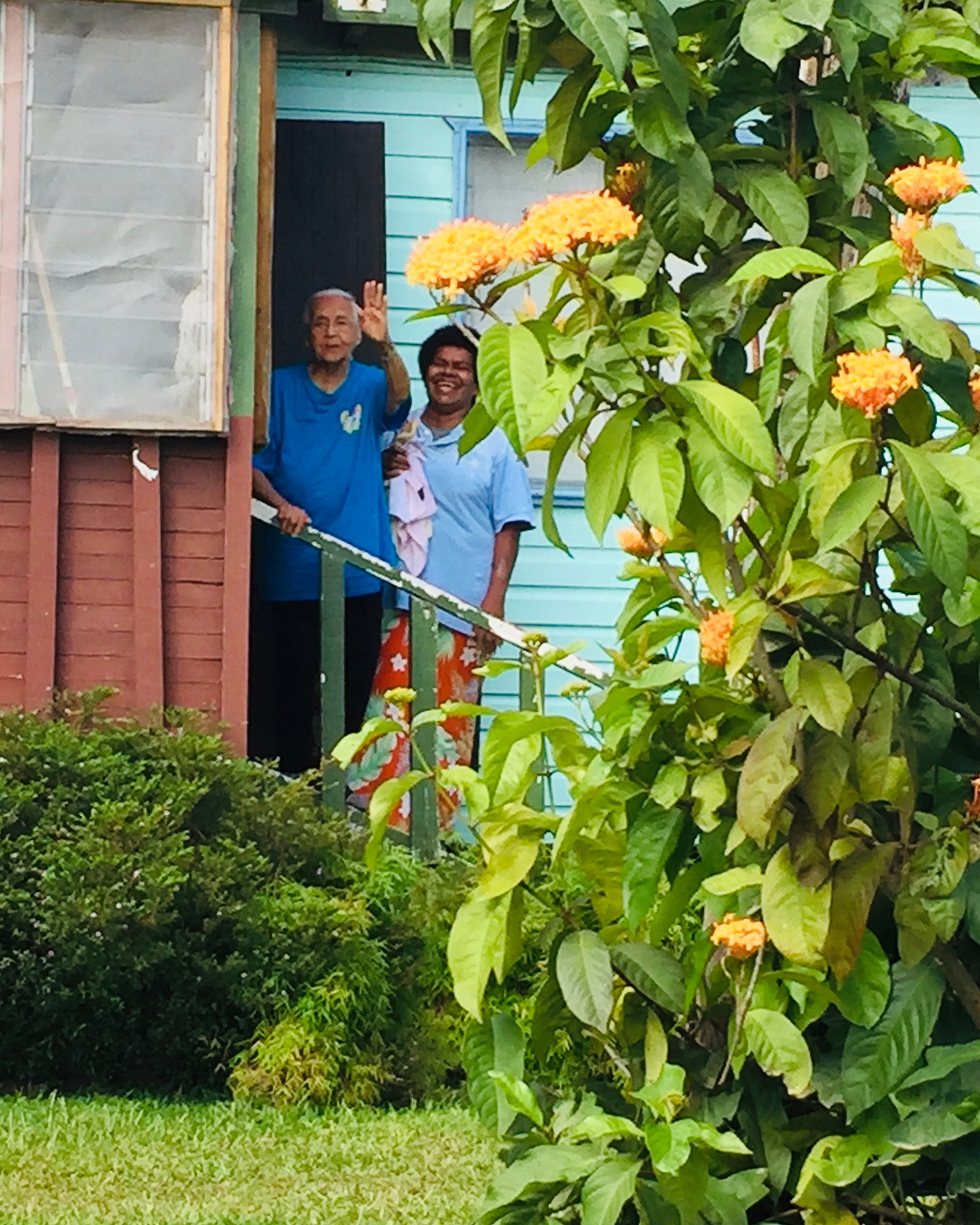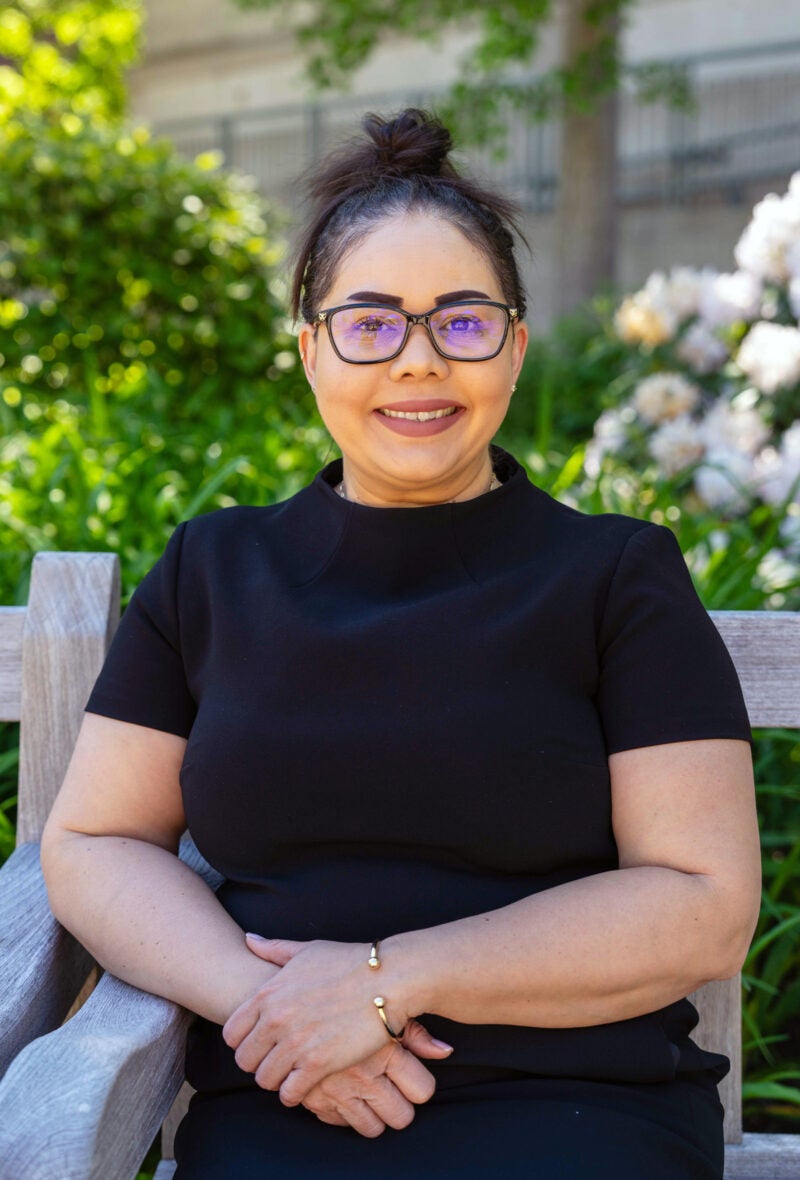Esther Gabriel ’25, a native of Fiji, had been living in the United States and working as a financial adviser for 15 years when she got a call from home with an urgent request.
Elders in her family’s village of Vunibau in Serua province asked that she bring her education back to Fiji and help find solutions to the threats from climate change. “I was asked by them, ‘Isa Esther, is anyone going to come and help us?’” she said. “Life is just getting harder and harder in the Pacific. They expressed a very urgent concern, asking ‘What do we need to do?’”
Fiji, an archipelago of more than 300 islands in the South Pacific Ocean, relies on the land and sea for its sustenance, with farming and fishing among the nation’s largest industries.
As climate change accelerates, nearly every aspect of traditional Fijian life is under threat, Gabriel said. As the seas warm, fishing becomes unpredictable and more time-consuming. As the soil becomes saltier, agricultural cycles destabilize, leaving farmers with less time to harvest. More frequent hurricanes are causing mass homelessness with no time to rebuild in between.
“This is a moment in Fiji’s history when we’ve been really challenged as an island nation,” she said. “As part of the broader Pacific region, we’re not necessarily a people that has relied on money as a means of living. We’ve relied on the ocean for our food and the land to plant.”
When her elders reached out, Gabriel was well-suited to respond. After receiving her mathematics degree from the University of Hawaii at Manoa, she expanded her knowledge of finance and economics while working at big banks in the United States. As a Pacific Islander with dual citizenship and residence in the United States, Gabriel sees herself as uniquely positioned to bridge two worlds.
“For those of us who have that privilege, I feel it is our duty to help to operationalize meaningful strategies,” she said. “I applied to law school because if I’m truly to understand what is going on, what’s the global discourse, what are people saying about climate change in the South Pacific context, what resources are being moved around to help local communities that are struggling, I must be knowledgeable, and I must speak the language of the day with authority.”
Gabriel said she arrived at Harvard Law School feeling the support of her family and fellow islanders behind her. “It’s a huge moment for us in the Pacific; we’ve acquired a seat at a table. We in the Pacific always say we are one family connected by one ocean, whether you’re in Fiji or Tonga or Samoa or any other Pacific nation. We are very unified by our culture, our way of life, and, in this moment, our struggles.”

As she immersed herself in the study of law, it occurred to Gabriel that her people’s call for help is not coming from a traditional American legal perspective, one of settlements filed and damages paid. The Fijian mindset is not one of seeking one-to-one remedy, she said, but a return to a perspective of common humanity.
“They’re saying: This issue of climate change is far beyond our capacity. We are praying that the world can see and help because the burdens are so heavy to carry alone. Not because anyone owes us a duty to help, but because people are still kind enough to do so. That’s a very different perspective.
“I’ve learned in being at Harvard that I am a bit different,” Gabriel said. “As an Indigenous person, we think very differently, and being a responsible representative requires me to maintain very strict awareness of my Pacific Island heritage, culture, lineage, and ancestry, while also trying to communicate in the Western discourse or Western dialogue. You have to be respectful of each community being very different, even though our struggle may be shared.”
During her second year, she enrolled in the Emmett Environmental Law & Policy Clinic and immediately fell in love with the work and the community. “The Environmental Law & Policy Clinic has opened otherwise foreclosed doors for me,” she said. “It was a transformative experience.”
Through the clinic, she completed externships with the U.S. Department of Justice’s (DOJ) Environmental and Natural Resources Division, Indian Resources Section, and the Office of U.S. Sen. Brian Schatz (D-Hawaii).
Gabriel describes the clinic’s faculty and staff — clinical professor Andrew Mergen, clinical instructor Sommer Engels, clinical fellows Rosa Hayes and Shannon Nelson, and staff assistant Jackie Calahong — as “superhero mentors” who have guided her through the complexities of legal education as a first-generation student.
“I didn’t know what the DOJ was when I got here. I didn’t know how many justices were on the Supreme Court. It’s just not a conversation that happens in my family — I’m the first one with an undergraduate degree, so I didn’t have that institutional knowledge.”
The clinic team walked Gabriel through perplexing legal questions, helped her prepare for interviews, even sat with her as a loved one was undergoing surgery. “They are true advocates. They have held my hand through every step of the process here.”
“It’s a huge moment for us in the Pacific; we’ve acquired a seat at the table.”
As part of a clinical externship with the Indian Resources Section, Gabriel got a glimpse into how the U.S. government works with Native American tribes, exploring the nuances of land trusts. She said it was an honor to do work that hit so close to home, since “As an Indigenous person, it is important to protect the rights and well-being of Indigenous people: our land, waters, culture, and community.”
The experience also put into perspective the role of the law in preserving environmental balance. “Having an analytical framework is so crucial, but rarely do we get to embody what it means to be vindicating the rights of the public in terms of public health, safety, and the environment. We take for granted that when we step outside, we get to breathe clean air and have access to clean water. And that comes from a very rigorous regulatory regime,” Gabriel said.
With graduation on the horizon, Gabriel has a clear vision for what comes next. First, she plans to clerk for the Supreme Court of Palau, an island nation in the northernmost South Pacific.
She then looks forward to bringing her education and network back to “Vanua Pasifika,” the land and people of her island region, and expanding a nonprofit she founded during her first year at Harvard Law, the Climate Defense and Development Charity, a nongovernmental organization dedicated to improving public health, safety, and economic advancement across the South Pacific.
The nonprofit has three main objectives. The first is developing disaster protocols and infrastructure to support communities in the aftermath of increasingly frequent natural disasters.
“I want us as Pacific Island people to have a well-executed disaster protocol system in place where we know, OK, don’t panic. A disaster has happened, and this is what we’re going to do every time,” Gabriel said. She plans to build warehouses for portable disaster shelters that can be set up in affected villages to help provide food, shelter, and housing.
The second objective addresses economic opportunity through a managed market system for traditional fishing and farming.
The third component is a technology institute that aims to combine Indigenous knowledge with modern solutions. “We have our new climate-induced challenges regarding fishing and farming, but we occupy the field in terms of skill and resilience. We have unparalleled ancient knowledge and practices specific to our Vanua,” Gabriel explained. “Now let’s see what technology opens up for us. Can we make our soil less salty? Can we find alternative fishing grounds using technology to predict the currents and the fish? Technology enhances, not replaces.”
Her approach reflects her understanding of both Western and Pacific perspectives on environmental justice — she sees hope in bringing diverse thoughts together. “People approach things in different ways,” she said. “I want to be conscious of taking a step back and not doing things either in a Western way coming into the Pacific or in a Pacific way that has no idea of the Western access or thinking. I truly want my organization to be something that marries the best of both.”
Her vision extends beyond crisis response to broader questions of sustainable development. “Indigenous people walk through this world very differently,” Gabriel said. “We care deeply about our duty to our Vanua: the land, the sea, and its people. We strive towards harmonious balance over extractive-laden principles. We believe in and fight for reasonable growth, not acceleration at all costs.”
She challenges stereotypes about Indigenous perspectives on progress: “Sometimes we’re painted as if we only want to worship our mountains and our oceans, and we don’t want to advance. But that’s not true. We do want to advance, responsibly. We understand that there is a cost to advance. But the question is about balance — the idea of sufficient or enough controls. We must be conscious and accountable for our decisions.” While the challenges facing Pacific island nations grow more urgent by the day, Gabriel said she remains optimistic about humanity’s capacity to address climate change through collaborative approaches. “The moment is ripe for cross-border kindness. Change is worth it, and the moment is now.”

View full coverage from the festivities of the 2025 Class Day and Commencement Ceremonies at Harvard Law School
Want to stay up to date with Harvard Law Today? Sign up for our weekly newsletter.
